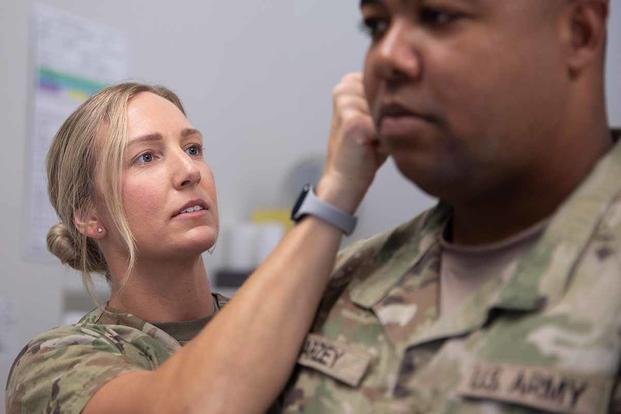Gunfire, artillery, aircraft, helicopters, lawnmowers -- all are fairly common equipment heard or used by military personnel from the first days of their service. But all of them also cause long-term damage to human hearing. As a matter of fact, anything more than 85 decibels will cause harm, and the louder it is, the less time it takes to damage hearing.

For many veterans, the most common symptom of long-term hearing damage is tinnitus, the ringing, buzzing or hissing in the ear that we can hear but has no external source. It’s not limited to veterans, but it disproportionately affects the veteran population as a byproduct of their work. But hearing aid manufacturer ReSound, one of five major U.S. hearing aid developers, has developed a smartphone app called ReSound Relief, available via iOS or Android to anyone suffering from tinnitus.
Dr. Laurel Christensen is the chief audiology officer for GN ReSound. She’s been working in hearing aid development for more than 25 years, but her most important connection to her work is that she, too, suffers from tinnitus.
“In the United States, 3 million current service members and veterans experience tinnitus, and it’s the most common service-related issue,” Christensen told Military.com. “We don't really know what causes tinnitus, and that's one of the reasons why there is no cure. It's certainly our brain's response somehow to losing our hearing or to noise exposure. But everything with tinnitus and working with patients who have tinnitus is centered around managing it.”
One of the most effective ways of managing tinnitus is sound therapy, which involves using external sounds to manage and reduce the perception of the condition. Sounds such as white noise, nature sounds or instrumental music can be used to cover or reduce the prominence of the tinnitus sound, stimulating the auditory system to help the brain become accustomed to tinnitus.
“It’s about habituation,” Christensen said. “Trying to get you to focus less on that one sound, so we add more sounds for you to habituate to it. Imagine you are in a dark room and you light a candle. That candle puts out a massive amount of light, and it's what you focus on. If all you can hear is tinnitus all day, every day, then you focus on it. If you add more light to the room, then you don't really focus on that candle anymore. And if you then turn up more noise, you start to habituate and not really focus so much on your tinnitus.”
That’s where the app and others like it come in. The ReSound Relief app can be played directly into some ReSound hearing aids via Bluetooth as well. In fact, there are hearing aids, such as the ReSound Vivia, that have sound therapy options within the hearing aids themselves. While Christensen would love for veterans to try a ReSound hearing aid, she reminds them they don’t need a ReSound device to use the ReSound app; it can be used with Apple or Android devices and played with Bluetooth speakers, headphones and, of course, hearing aids.
“If you give someone the Relief app, you’re giving them a lot of information about tinnitus in there,” she said. “But there are also soundscapes, like beach sounds, for you in there. We have also developed some soundscapes to use, as well as things like masking noise, white noise, pink noise.”
The app was developed with a number of clinically validated elements, such as sound therapy and informational counseling, but was specifically tested at the Institute of Physiology and Pathology of Hearing in Warsaw. The six-month study found the ReSound Relief app showed a reduction in tinnitus severity over the course of each three-month interval.
While so many veterans are already aware they suffer from varying degrees of tinnitus, Christensen reminds them to still take the proper steps toward treatment. Seek information about tinnitus and get an examination to find out whether your ears are ringing because of hearing loss or some other cause -- because there are things that can be fixed.
“When you have your ears completely, totally occluded with wax, it can actually cause some tinnitus, something that's easy to deal with,” she said. “Then there’s Meniere's disease that can come with dizziness and hearing loss. Stress and caffeine can also be triggers.”
Christensen reminds veterans that while living with tinnitus can be a struggle and there is no direct cure, tinnitus management is possible, and something that can be done with counseling, such as cognitive behavioral therapy or tinnitus retraining therapy.
“I am always so hopeful about it, because you see patients that are completely debilitated by it, and there are people who commit suicide due to tinnitus,” she said. “One message you want to be pretty strong on is that you can manage your tinnitus, that it is possible to do. Get that medical evaluation, see an audiologist, see if you have hearing loss, get hearing aids and get sound therapy in those hearing aids. Use things like the ReSound Relief app.”
Veterans who want more information about tinnitus or ReSound hearing aid products should visit the ReSound website. Those interested in downloading the ReSound Relief app can at the App Store or on Google Play.
Want to Learn More About Military Life?
Whether you're thinking of joining the military, looking for post-military careers or keeping up with military life and benefits, Military.com has you covered. Subscribe to Military.com to have military news, updates and resources delivered directly to your inbox.







